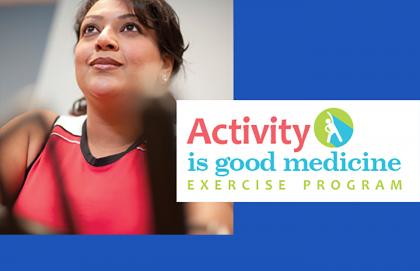About 10 percent of the people in the United States have diabetes, and about 88 million have prediabetes. At Cheshire Medical Center, we offer coordinated services for patients with both type 1 and type 2 diabetes, to make sure you receive the most personalized care. Your collaborative care nurse is your partner in managing your health condition. They assist with the education, monitoring, and support you need to improve your lifestyle and quality of life.
Preventing type 2 diabetes
One in three Americans is prediabetic. Get the information and support you need to cut your risk of developing type 2 diabetes by more than half—in a positive, team setting. Learn more about Cheshire’s Diabetes Prevention Program.
What is diabetes?
Diabetes results from problems with the production of the hormone insulin in your pancreas. When you eat food, the sugar from that food moves into your bloodstream. If you have insulin problems, your body’s cells can’t use that sugar for energy properly. When this sugar isn’t used for energy, your blood sugar (glucose level) increases. There are many health problems caused by high blood sugar.
People with type 1 diabetes don’t produce insulin. Symptoms often develop fast, over several weeks. People with type 2 diabetes don’t respond to insulin well or don’t make enough of it. Symptoms may not appear for years and may develop very slowly.
While diabetes doesn’t have a cure, with the help of health care professionals, most people can manage their diabetes with a healthy diet and a physically active lifestyle.
Warning signs
Are you wondering if you might have diabetes? If you are experiencing some of these symptoms on a regular basis, please make an appointment with your primary care provider. The symptoms can come on slowly or quickly.
- Blurred vision
- Dry mouth
- Extreme thirst
- Fatigue
- Frequent urination
- Hunger
- Irritable behavior
- Skin that itches or is dry
- Wounds that don’t heal quickly
- Yeast infections
How we can help
If you receive a diabetes diagnosis, we are here to support you. From day one, your collaborative care nurse has regular check-ins with you. Together, you review lab tests and health screenings, and monitor the progress of your diabetes management plan. They often offer health coaching and can connect you to services offered through Cheshire’s Center for Population Health and our community partners.
Our endocrinology team’s diabetes care and education specialist supports patients with diabetes by offering education about how you can best manage your health. For example, you receive training and support if your doctor recommends you use a device like an insulin pump or continuous glucose monitor.
Collaboration for the best care
Cheshire’s collaborative care nurses coordinate with other experts as part of your personalized care plan. For example:
- Endocrinology to support healthy hormone function
- Diabetes Education to support ongoing diabetes self-management
- Pharmacy to make sure your medication plan is best for you
- Nutrition services to help you craft diet goals that support your health
- Podiatry to address any complications with your feet
- Ophthalmology to care for your eye health
- Wound care specialists to heal complex or chronic wounds
Your personalized treatment plan
As you tell us about lifestyle, work, activities, and diet, we help design the best plan of care for you. Day-to-day problems that come with diabetes include:
- Availability of healthy foods
- Being overwhelmed with other commitments
- Figuring out what to eat at restaurants or social gatherings
- Financial stress trying to pay for medications
- Lack of transportation or funds for exercise
- Loneliness, or lack of family or community support
- Mental health struggles, such as depression or anxiety
You may also be facing other significant health problems. Diabetes puts you at greater risk for:
- Blindness
- Heart attack
- Loss of toes, feet, or legs
- Kidney failure
- Stroke
We work with you and all our resources to help you address these obstacles.
Visit Prescribe for Health at the Center for Population Health, to help with logistical issues such as financial support, transportation, access to food and exercise, and more.
One-on-one nutrition support
Our Registered Dietitians (RDs) are available to help you with individualized nutrition planning and counseling. Working healthy eating into your lifestyle is one of the most important ways to manage your diabetes and avoid life-threatening complications.
Everyone’s needs and food preferences are different. Working one-on-one with a dietitian is the best way to find a way of eating that helps your health and works for you. You need a referral from your doctor or primary care provider, so ask about one at your next appointment, or via your myDH patient portal.
Learn more about Cheshire’s Nutrition Services.
More resources
The Dartmouth Hitchcock Medical Center (DHMC) site offers additional resources. Find educational information, online tools to support healthy blood sugar levels, and explanations of routine tests.


